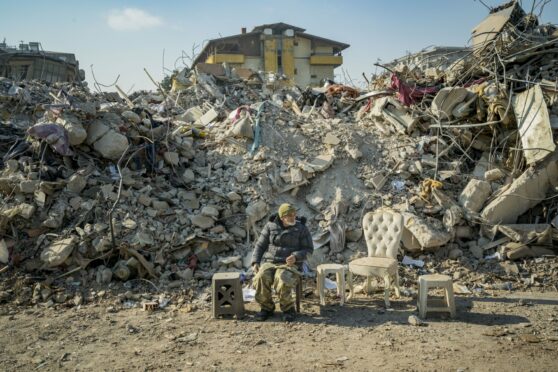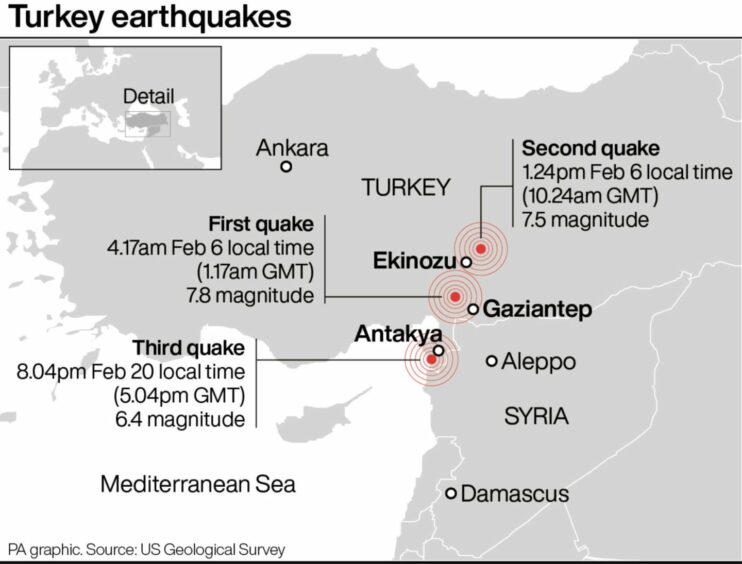
A medical and humanitarian catastrophe triggered by the earthquakes in Turkey and Syria will take at least two years to resolve with 18 million people directly affected by the disaster, warn emergency medical teams.
Medics face a fraught situation, with homes and hospitals destroyed, many people living in sub-zero temperatures in temporary shelters, without access to food, healthcare and other essentials.
Healthcare professionals also face the threat of aftershocks and fresh earthquakes as they battle to save lives and get aid to families.
Britain’s Foreign, Commonwealth & Development Office has sent medical teams to the disaster-hit region as part of the UK Government’s humanitarian response to the earthquake.
At a joint field clinic and hospital in Turkoglu in southern Turkey, which has now treated a total of more than 3,350 patients, five of which have been surgical cases, chief pharmacist Dr Liam Callaghan said relief work was still in its early stages.
Callaghan said: “Considering the effect on certain communities here, it probably could take about two years to resolve this. It will more than likely be months for us before we integrate with the Turkish primary healthcare system and hand over the facility to Turkish healthcare workers to continue the care we have started.
“We are looking at months to keep providing support and then hand over so they can sustain the ongoing work we are doing here.
“Structurally it really could take years to sort out when you see the devastation throughout the country.”
A major earthquake hit the Gaziantep region of south-east Turkey and the north-west region of Syria on February 6.
Later that day a second major earthquake occurred in the Elbistan district of Kahramanmaras, 80 miles north of Gaziantep.
The UK Government provided a team of 77 search and rescue experts with specialist equipment. The combined death toll in Turkey and Syria now stands at 47,244.
Callaghan, who works with the UK-Emergency Medical Team (UK-EMT), said: “Housing and shelter is an issue.
“The nights are very cold and you have entire families living in tents with temperatures dropping to -6C at night.
“We have created safe spaces for women and children and we are also seeing a lot of respiratory conditions as people are exposed to the elements. There was a 6.8 earthquake at the start of the week. I felt the ground move in the camp and it took a while for your brain to register that the earth was actually moving beneath your feet.
“There is no escaping the earthquake here. That was my first earthquake. It was terrifying and a very strange sensation.”
Callaghan, chief pharmacist at Western Isles Hospital, has been deployed to Turkey through the Foreign, Commonwealth & Development Office’s response to the earthquake.
He added: “We have now integrated with the Turkish medical teams and things are running quite smoothly at this stage. We have a good mix of MoD, UK-EMT and Turkish clinicians working together in specialist areas such as paediatrics, emergency department and obstetrics.”
His team with surgical capability and equipment have set up a field hospital to provide more comprehensive medical support.

The UK Government effort has also sent life-saving items to Turkey and Syria, including thousands of tents and blankets to help people keep sheltered and war.
More than £3.8 million has been sent to the White Helmets rescue organisation to aid their major search operation in north-west Syria.
The UK Government has also committed up to £5m match funding to the DEC joint Turkey/Syria appeal to support British aid organisations.
Dr Freda Newlands is another medic – who has saved lives on the frontline in Ukraine – now ready to deploy to Turkey to deal with the aftermath.
She was in Ukraine within weeks of the Russian invasion a year ago helping people whose lives were shattered by Vladimir Putin’s forces.
The emergency medicine specialist has been tormented by the scenes of devastation caused by the earthquake in Turkey and Syria with the tragedy reawakening her urge to go there to help.
Newlands, from Kippford, Dumfries & Galloway, said: “The war in Ukraine started on February 24 and I was in a small group that went on March 7.
“I was involved in setting up primary health mobile clinics, kind of like GP clinics. We would take them around to various little villages to really to look after the people that were left behind.
“That included people like the elderly and those who just couldn’t leave such as people with chronic disease.
“Many of them didn’t want to leave their country so they stayed behind and some were not immediately physically affected by the war but had huge psychological trauma.
“And then they still had all their ongoing chronic diseases to be looked at. The earthquake has brought all of that back.
“It has brought all those feelings up for me again. It’s all reignited the psychology of it for me and suddenly I am absolutely asking myself why am I here and not over there?”
Newlands has also treated casualties on the Syrian border and helped to tackle a deadly outbreak of diphtheria in Bangladesh.
She retrained as a doctor in her 40s after a 15-year career as a secondary school biology teacher.
She said: “It’s a world away from Dumfries & Galloway. I worked in the Syrian conflict, South Sudan and Bangladesh and whenever you come home, it takes a period of adjustment.
“I get quite cross with trivial stuff. When you just come back from a war zone or a natural disaster, life can seem a bit frivolous.
“You see people getting cross because there’s no car park space or something and you just think, ‘Really?’”
Newlands works with UK-Med, a frontline medical aid charity, which has a register of hundreds of UK health workers trained for emergencies who are on call to get to disaster zones at 24 hours notice.
She added: “I don’t see any end yet in Ukraine. There’s no sign of anything getting any better unfortunately while Putin is still in charge.
Turkey launches investigation into 612 people after earthquake
“I do find my work satisfying and it feels the right thing to do. My two children are grown up and I just have to be responsible for myself and my dog.
“I can pretty much down tools and go. When they saw the earthquake, both of them were saying, ‘Have you got your bag packed and when you are you going?’
“We are on 24 hours’ notice so I do have a grab bag ready to go. I know some of the guys have gone out from both the search and rescue team with the dogs.
“Once they’ve done a needs assessment, we will find out what we can do to help.”
Firefighters from the Scottish Fire and Rescue Service were part of a 77-strong UK International Search and Rescue (UK-ISAR)team which spent 10 days searching for survivors in Turkey.
Watch Commander John Aitchison, of Portlethen Training Centre, said: “It was like being in a film set.
“Everything was utter devastation. Multi-storey buildings looked like they had been picked up and thrown back down on the ground again. Some buildings were upside down, some buildings were on their side.
“People had lost their family. It was like the news reports of war zones where you see women crying, fathers trying to get kids out of rubble. People were crying and trying to get us to help them at every street corner.”
UK Minister for Development Andrew Mitchell said: “The UK Government is proud that brave Scottish firefighters and medics have been at the very heart of our efforts to help the Turkish people in their hour of need.
“Both the UK-ISAR and UK-EMT pool world-leading expertise from across Britain to make a real difference in reacting to humanitarian disasters around the globe.
“The UK Government’s priority now is to ensure humanitarian assistance reaches the thousands of families left homeless by the earthquake.
“It will be so vital in ensuring those affected can begin to rebuild their lives.”

Enjoy the convenience of having The Sunday Post delivered as a digital ePaper straight to your smartphone, tablet or computer.
Subscribe for only £5.49 a month and enjoy all the benefits of the printed paper as a digital replica.
Subscribe